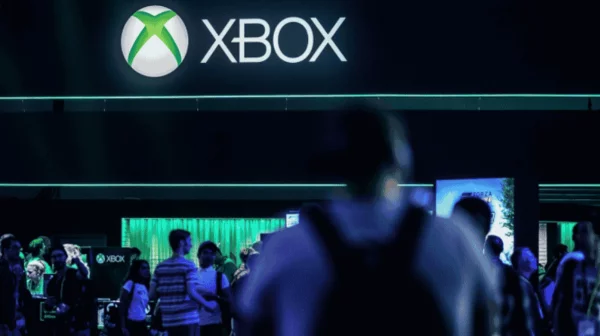BY Trilby Beresford, The Hollywood Reporter
“To me, accessible gaming, and accessible content in general, means that everybody should have the same experience no matter their situation.”
These words come from Sean McIntyre, whose career in entertainment has included helping to produce live events such as the Electronic Entertainment Expo (E3) and serving as a producer on G4’s Attack of the Show. He’s now the accessibility lead for Xbox Marketing and distribution lead for programming and events. “They should be able to take away what the person next to them does regardless of vision, hearing or language,” McIntyre tells The Hollywood Reporter over email.
Toward one of these goals, Xbox recently partnered with Sorenson, a communications company with an expansive sign language interpreter base, to launch a dedicated channel on Twitch featuring American Sign Language interpretations, strategies and tips to help the community of Deaf and hard-of-hearing gamers actively participate in streams.
In addition to providing interpretations for approximately 25 hours of livestreams a week, the channel will include interviews with game developers, esports tournaments, event coverage, streamer takeovers and spotlights on independent games that never received captioning.
“At Xbox, we are committed to making gaming fun for the billions of people around the world that want to play and create,” Anita Mortaloni, director of accessibility at Xbox, tells THR. “This means continuing to identify barriers to play, making it easier for developers with disabilities to create and be part of the gaming community, and partnering with the disability community to bring their lived experiences into games and how they are built.”
Mortaloni got into accessibility through engineering and a particular interest in inclusive design. During the pandemic, she tells THR that she directly experienced the connection that gaming provided her family “and wanted to make that feasible for as many people as possible to do the same.” That prompted her to lead the accessibility effort at Xbox.
Such a task includes partnering with the disability community to create accessible and innovative experiences. One way that Xbox does this is through the Insiders League — anyone who self-identifies as a person with a disability, as well as allies of the community, can provide feedback directly to Xbox engineering and game development teams.
Another way is through Microsoft’s gaming accessibility testing service, where studios can seek feedback, guidance and support from members of the disability community during their development process. Xbox also offers learning resources for designing and validating the accessibility of a game, and an online course centered around the basics of gaming accessibility and best practices when it comes to hardware, software and assistive technology.
In creating the ASL channel, McIntyre explains that Xbox worked with a team of interpreters from Sorenson — gamers themselves, who understand the intricacies of gaming “lingo” and how its authenticity and accuracy is critical.
One of the features he is particularly excited about is the opportunity to dive into the archives of Xbox titles that predate when most titles started to receive captioning. “There are so many games that those who rely on interpretation have never gotten the chance to experience due to them being audio-only,” says McIntyre, “and it’s all the better that these titles are still fresh today due to so many being available via Xbox Game Pass.”
Game Pass is the brand’s subscription service, in which players can choose a certain plan and receive access to a vast number of studio and independent video game in genres ranging beyond the standard first-person shooters (DOOM Eternal) and racing titles (Forza Horizon 5) to include strategy games (Among Us) and story-driven puzzles (Unpacking), simulation (Stardew Valley), action role-playing (Death’s Door), cooperative cooking (Overcooked 2), seafaring epics (Sea of Thieves), episodic narratives (Tell Me Why), family-themed adventures (It Takes Two) all the way to a calming and charming mail delivery game called Lake.
“I’m really excited for the future and current gamers who are deaf,” Sorenson’s vp of brand marketing Ryan Commerson tells The Hollywood Reporter over Zoom, in a conversation conducted with the assistance of certified ASL interpreter Brad Holt, who serves as an exec at Sorenson. “Especially future generations, because I really know what this means. I understand the implication of something like this. This has huge implications, huge impact.”
Commerson was born into a hearing family, having only one distant cousin who is also deaf. He began learning ASL at 4 months old, with a mother who committed to teaching him and would emphasize the necessity of learning about the world directly through his eyes. “Whatever I saw, that was the information I got,” he recalls. “If it was not written down, if it was not signed to me, I didn’t know it. So, my mom would take time, put the effort in, sitting down and walking me through everything that was going on all the time so I could actually learn about human interaction, the rules of engagement, social cues, cultural norms, learn about pop culture.”
Video games were not a huge part of Commerson’s upbringing, which he partly attributes to the fact that few tools were available for him to communicate properly with other players. These days he’ll get online and play a few games with his young nieces and nephews, which he enjoys.
And he’s fully aware of the landscape: “Gaming in the ’80s and ’90s is not like gaming today,” says Commerson. Back then, he says, gamers were viewed as “weird people, social misfits maybe.” Today, he explains, it’s a way of life. “People learn social skills be playing games. They learn life lessons. They learn how money works. They learn how politics works. They learn the art of negotiating. All through gaming. Gaming is educational. And it’s a new way of educating the younger generations, babies as young as one or two years old. They pick up an iPad and start experiencing life through playing games.”
Click here to read the full article on The Hollywood Reporter.



